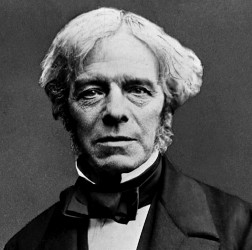 defining characteristic of our age is the absence of wisdom.
Whatever one thinks of the propriety of news outlets knowingly
publishing falsehoods, social media censoring speech, or a leader
of one country wandering around looking confused while his adversary
decides to conquer his neighbors, we can be
sure of one thing: wisdom is not involved.
defining characteristic of our age is the absence of wisdom.
Whatever one thinks of the propriety of news outlets knowingly
publishing falsehoods, social media censoring speech, or a leader
of one country wandering around looking confused while his adversary
decides to conquer his neighbors, we can be
sure of one thing: wisdom is not involved.
This looks like a job for Science.

Michael Faraday was wise about the magnetic field and electrochemistry
This February, in a charming paper in Current Psychology, four scientists[1] took a reductive approach. They defined wisdom as
a global psychological quality that engages intellectual ability, prior knowledge and experience in a way that integrates virtue and wit, and is acquired through life experience and continued practice.
It will not surprise anyone to learn that psychologists have already created four different measures of wisdom: the Three Dimensional Wisdom Scale (3D-WS), the Self-Assessed Wisdom Scale (SAWS), the Adult Self-Transcendence Inventory, and the Integrative Wisdom Scale (IWS), none of which is completely satisfactory.
The problem, say the authors, is that wisdom is also domain specific. They point out that Confucius was unable to give good advice about how to grow crops, and his wisdom was of a different type than that of Michael Faraday, who was very wise indeed when it came to magnets. Building on Sternberg's classification in the Cambridge Handbook of Wisdom (CUP, 2019) of deep domain-general, shallow domain-general, deep domain-specific, and shallow domain-specific wisdom, they propose three general types: domain-specific wisdom, domain-general wisdom, and omniscient/overall wisdom. The hope is that once it's nailed down, a test can be devised to measure it, similar to Spearman's g for intelligence. Then, with luck, we may look forward with interest to a genome-wide association study to identify the DNA responsible for it. If we're truly wise, we'll come up with a wisdom-enhancing drug. Or we might recognize that wisdom is one of the few things that cannot be reduced to DNA. We will just have to wait and see.
We talk about the wisdom of the past: the Greek historian Polybius who foresaw the decline of Rome and was thenceforth blamed for it, and the wisdom of those who have studied the past and actually learned the lessons it teaches, as opposed to those who cherry-pick it to promote their ideology.
Against that we might add the newfound distaste for individualism among some on the right and the enthusiasm for intolerance and repression on the left, as if both sides envied the worst in the other.
Or take feminism, which is now backed into such a corner that it is forced to assert that there is indeed such a thing as a woman. Trans activists believe that being female is little more than a state of mind and a large collection of shoes. Yet in a stunning display of ideology triumphing over logic, some feminists blame not the activists' use of the ideology that feminism itself created, but the Patriarchy.
I happen to think ‘women exist’ is on pretty solid ground; the fact that this has somehow become controversial is proof that there is a critical need to find a gene for wisdom. But leaving such questions aside, maybe wisdom can be produced in the witches' cauldron of a belief system that finds itself in despair about whether its fundamental assumptions are true or the product of half a century of half truths and tunnel vision.
Or perhaps we can identify wisdom by looking at its opposite. In the absence of wisdom, we are reduced to formulating rules and formal mechanisms, which is how the IRS ended up with 800 different tax forms, including twenty versions of the beloved 1099. In their infinite wisdom, the giant tax bureaucracy sent thirteen-page questionnaires to taxpayers (along with a page of instructions) asking whether, perhaps, the tax code might be a tad too complicated. I wondered whether they got a single response. Most of them probably ended up as joke material: the questionnaire was too complicated, or it took seventeen hours with H&R Block to fill it out. The last thing people want is to get letters from the IRS, yet they kept sending us reminders as if to prove that they know which questionnaire belongs to which individual and will deal with any unwanted answers accordingly.
I have a policy of never volunteering information to anyone who can throw me in prison for saying something they don't like.
Alas, after the Covid fiasco, it seems clear that not even science has the wherewithal to define wisdom, let alone the authority to impose it. Wisdom may be a composite of many traits, or maybe it's one of those things that by definition can only be found after it's too late to be of any use. Most likely we would have to find a way to make humans smart first. But think of the benefits if we succeeded.
On the other hand, maybe wisdom is the recognition that the world is enormously complex and simple-sounding solutions usually produce an effect that is opposite to what is intended. If so, the wisest plan may be not to mess with it.
[1]. Zhang K, Shi J, Wang F, Ferrari M. Wisdom: Meaning, structure, types, arguments, and future concerns. Curr Psychol. 2022 Feb 5:1–22. doi: 10.1007/s12144-022-02816-6. PMID: 35153458; PMCID: PMC8817649.
apr 17 2022, 6:24 am. updated apr 18 2022
